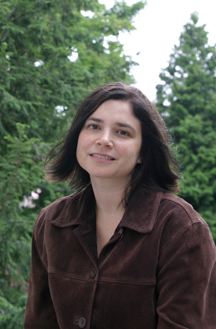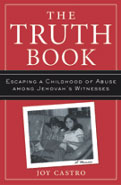Joy Castro knew writing a memoir about her childhood abuse at the hands of a tyrannical stepfather — who twisted Jehovah’s Witness doctrine to suit his own foul value system — would generate negative responses, but she hoped for positive feedback as well.
Not only has that happened, but other developments since the Wabash College English professor published the autobiographical "The Truth Book" have made the experience absolute gravy.
 Released in September, "The Truth Book" chronicles, in part, the two-year period in Castro’s life when she and her brother Tony lived with their mom and stepfather in West Virginia.
Released in September, "The Truth Book" chronicles, in part, the two-year period in Castro’s life when she and her brother Tony lived with their mom and stepfather in West Virginia.
The stepfather was a church leader in the Jehovah’s Witnesses, a hard-line sect of Christianity. He subjected Castro and Tony to constant beatings, starvation and near isolation before Castro ran away and legally emancipated herself to live with her father and his new wife. Tony made his escape six months later.
Jehovah’s Witnesses preach female subjugation to males, an axiom Castro rejected. She later earned her bachelor of arts in English at Trinity University and her master of arts and Ph.D. in the same at Texas A&M.
It was in 2002, when Castro’s father committed suicide, that she began to take stock of her life. At a writer’s retreat in Minnesota a month later, she churned out 300 pages of tight, emotional prose in a feverish three-week time frame. It later formed "The Truth Book," named after Jehovah’s Witness literature that’s considered required reading.
Since the book’s publication, it’s been reviewed in such periodicals as the Boston Globe and Sacramento News & Review. Subsequent book tours have taken Castro to Tampa and the northwest. Overall she describes her readings and discussions and encounters with readers as positive.
"Most of the reviews have been very nice, certainly as positive as I ever could’ve hoped for, for a book with controversial topics in it," Castro said. "It’s going to push some people’s buttons, and I understand that. At all the meetings I’ve done, the response has been very warm, and that’s been touching. People have had a lot of questions, made a lot of comments. A lot of people have shared their own experiences because of things I’ve read out loud or they’ve read in the book. So that’s been interesting. It’s been a real way to connect with a huge range of people."
Outside classrooms and bookstores, "The Truth Book" also has led Castro into other mediums. She’s done readings at Crawfordsville’s Rotary Club and a local Presbyterian Church. She was a speaker at the Indiana Coalition Against Sexual Assault’s conference in Bloomington in early December, where she led a workshop on writing as a way of overcoming trauma. These forums have brought Castro face to face with people who have similar stories to tell. It’s the type of response she’s both happy and sad to share in.
"I feel sad for them if their experiences have been negative ones," Castro said. "I’m glad they’re feeling OK talking about that because I think one of the things that’s problematic for people is a sense of shame or inhibition — that they’re responsible for the abuse that happened to them and that they can’t speak up about that. I’m happy they feel able to communicate. I guess I feel sad that it’s common, but not surprised."
 Castro can share in their discomfort. The toughest part for her has been baring her past to strangers, especially during public readings and the expected discussions that follow.
Castro can share in their discomfort. The toughest part for her has been baring her past to strangers, especially during public readings and the expected discussions that follow.
"I’m a shy person, so getting up in front of people and reading this gut-wrenching, personal material is a challenge," she said. "I would often go back to my hotel very drained — sort of exhilarated because of all the positive responses and interesting things I learned from other people — but also very tired. It just takes a lot of willpower and effort for me to do that. I think some people really get energy from performing. For me it sucks all my energy, and it’s hard. That challenged my comfort level."
In one case Castro was able to take potentially inimical feedback and make it productive. While she was sitting in a women’s study course at Indiana State University, "A woman raised her hand and said, ‘I’m a Jehovah’s Witness. Nothing like that ever happened to me. I want to say (your book is) not representative,’ " Castro said. "I said great, thank you, I’m glad and tell us your story because mine is the story of my individual situation. It’s not a blanket condemnation of a religion. It happened to be weirder to be abused in a situation where people were preaching love and kindness. But abuse happens in lots of religions."
With the favorable reviews, Castro also can bask in the affirmation she’s received on "The Truth Book" from literary scholars. The book will be taught this spring in graduate and undergraduate creative-writing courses at Ball State University. Kalamazoo College in Michigan will study it in a creative non-fiction class. Other institutions of higher learning, including Texas A&M, plan to incorporate it into their curriculums.
Most important of all, Castro wondered how her own community at Wabash would react to her revelations. The returns have been better than she ever imagined.
"One of the things that was troubling to anticipate was how my students would respond to the book, because it is so personal," Castro said. "I’d walk into class and wonder what they were thinking. I had such positive, warm responses from students. It’s touched many students personally. Some students have bought extra copies for their moms. That’s been amazing. I always knew Wabash was a very supportive community, but I had no idea how supportive. That was one thing that was unexpected about the book — to be supported by the people you work with every day."
 Coggeshall is a reporter for the Crawfordsville Journal Review. This story first appeared in the newspaper.
Coggeshall is a reporter for the Crawfordsville Journal Review. This story first appeared in the newspaper.